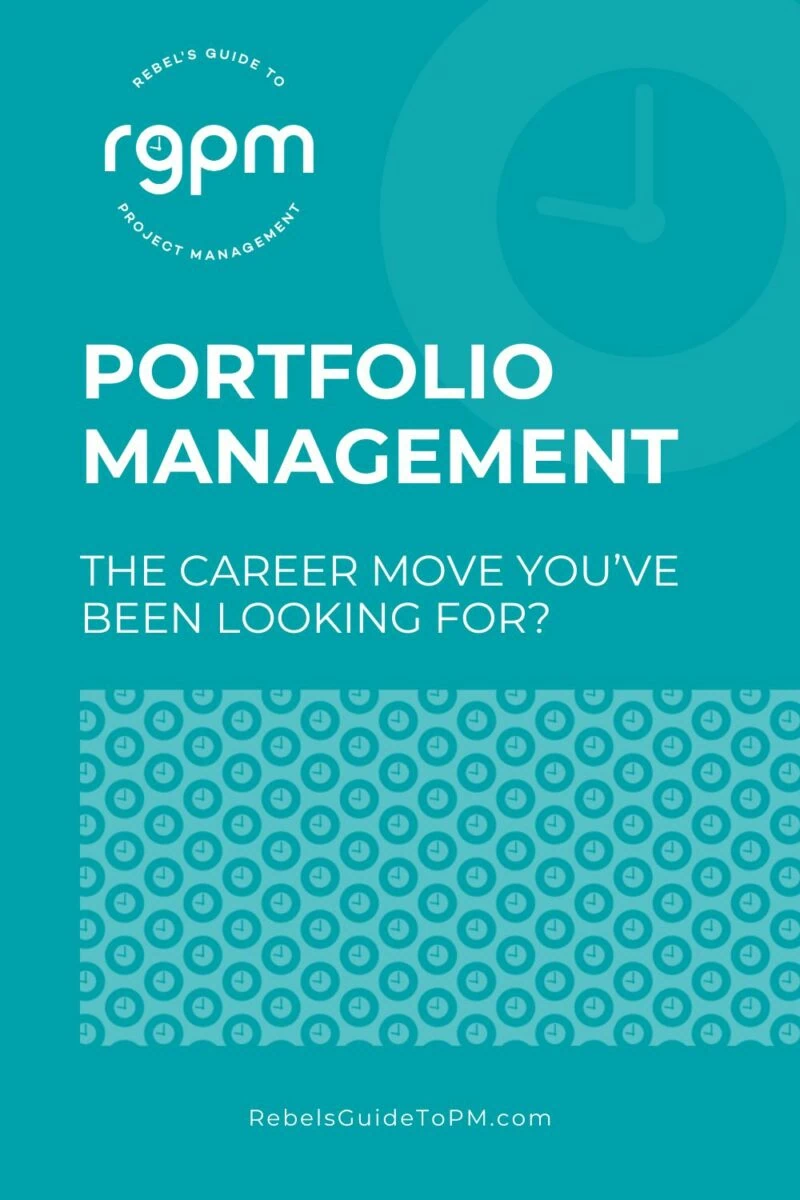Portfolio Management: The Career Move You’ve Been Looking For?
Are you looking for the next step in your career?
Project managers who want to move more into a strategic delivery role don’t always have that many choices. Career paths tend to lean towards larger, more complex and more strategically important projects, or program management.
Have you thought about moving into portfolio management?

What does a portfolio manager do?
Project portfolio managers are senior business leaders. It’s still a project delivery role, but it’s operating at a much more senior level, and you aren’t hands on in any project unless you are called in to troubleshoot.
In a portfolio management role you are likely to be responsible for a team of project and program managers, with portfolio management being an additional responsibility to the line management of those offices.
I’d argue that this is where most of your effort should be, so if you can get the line management of the delivery teams handled by someone else, that would give you more time to focus on the strategic elements of the job.
It’s a leadership job
As a portfolio manager you might head up a division with a significant amount of project management work, or you could be a Project Management Office manager or a project sponsor.
Of course, every portfolio manager has a slightly different focus and sphere of operation tying back to the business culture and the environment they operate in.
If you haven’t had this role in your business before you’ll probably get quite a lot of latitude about what you actually do day-to-day – many portfolio managers can shape the job to fit their interests and skills as long as the other key responsibilities are also met by people in the team.
Positions at this level carry a significant amount of influence over strategic direction and policy. Is it sounding like something you’d be interested in so far?
Key responsibilities for project portfolio manager
Some of the key responsibilities of a portfolio manager include:
Taking responsibility at the highest level for the successful completion of complex projects. That would include allocating the correct project manager and supporting team members. You could be the project sponsor for significant high-profile projects with far-reaching impact, political sensitivities or business criticality, and high-risk dependencies across the business.
Choosing the standards, approaches, methods and tools for projects or the division including taking the decision about what certifications your project managers and team members should have.
Ensuring that all project management best practices are followed including effective change control and risk management.
Monitoring and controlling the complete set of projects in the portfolio, with a special focus on resourcing across the business and managing the budgets.
Managing the expectations of everyone on the project from executive sponsors to end users, including key suppliers (ones that are used across multiple projects or programs – you wouldn’t get involved at an individual project level) and other relevant third parties.
It’s a busy and significant role that would appeal to project managers who want to move into a position that’s strategically important and yet still uses a lot of the core skills they built in a project delivery job.
Key skills portfolio managers need
As you’d expect, the key skills required for the job are the kinds of skills you need to be an effective program manager or senior leader in any other leadership role. For example:
- Effective communication
- Soft skills (PMI power skills, or interpersonal skills) like conflict management
- Leadership skills
- Understanding business benefits and strategic objectives
- Being able to work with senior managers and building relationships with key stakeholders
- Business acumen
- Analytical skills.
It’s a rewarding career that also requires specialized skills like synthesizing information and reporting.
How to move into portfolio management
If this sounds like it could be the next step in your project management career, first, you need to be in a business that puts emphasis on portfolio management.
While you can incorporate some of these elements into your job if you manage a PMO or a large division, it’s going to be far more effective if you have the support of the exec.
That’s something to work on first!
Assuming you’ve got that within your business, and there’s an awareness of the value that project management best practices and strategic execution can have on business success, then you need to look for ways that your project and program management experience lends itself to the strategic awareness and critical thinking required in the portfolio role.
If you’re taking a job in a different area of the country, check out how the cost of living impacts project management salaries, so you don’t end up earning less even though you’ve taken a step up.
Do you need a certification?
You don’t need a certification to be considered for a portfolio manager role. Hopefully your practical experience speaks for itself.
However, you might find it useful to have a certification if you are applying for jobs as it can help employers take you seriously. Certificates, or even a degree in project management, help employers identify that you’ve got the theoretical knowledge. It can be hard to establish if someone can do the job, so help them out by making it obvious you can.
There are certifications you can take that provide you with the tools, skills and frameworks required to be able to work in a portfolio management position, so it’s definitely worth mentioning this to your manager if you want to take your career in this direction.
Portfolio office roles
Finally, there are more jobs in the portfolio office than Portfolio Director. You can move into the area of portfolio management through a position in the PMO, or by taking a sideways move into a management role in the portfolio office.
Once there, you can build your skills, check out how you feel about the roles on offer (as it’s quite a different outlook to the role of a project manager) and think about what you need to develop in order to get the top job one day.

Resources for learning more
Here are some books about portfolio management that I can recommend. They are useful further reading if you want to learn more about what it takes to run a successful portfolio.
Management of Portfolios
Management of Portfolios is the Axelos best practice guide – the book from the same family as PRINCE2.
This is the guide that I would start with, if I were you.
The Handbook of Project Portfolio Management
The Handbook of Project Portfolio Management is a real guidebook. Edited by Dennis Lock and Reinhard Wagner, it brings together expert contributors so you get a lot of different perspectives on the practical processes, tools and techniques for running a portfolio.
This is the desk reference you’ll want if you’re going to impress at interview.
Executing Your Strategy: How To Break It Down and Get It Done
Executing Your Strategy is by Mark Morgan, Raymond E. Levitt and William Malek (Harvard Business Review Press).
Strategy isn’t something static any longer. This book talks about how to ensure your company’s strategic portfolio fits with the changing business landscape and flexes dynamically with you as it needs to. The authors set out an six-step approach to making sure that your strategic projects are the right strategic projects, and that they are carried out in the right way.
Taming Change With Portfolio Management: Unify Your Organization, Sharpen Your Strategy and Create Measurable Value
Taming Change by Pat Durbin and Terry Doerscher (Greenleaf Book Group) was the first book about portfolio management that I read and it’s a comprehensive overview of what it is and how it works. Billing itself as a “definitive” resource, you’ll certainly find a lot in here to help you understand how successful portfolios should operate in a world of constant change.
Strategic Project Portfolio Management: Enabling a Productive Organization
Strategic Project Portfolio Management by Simon Moore (Wiley) is the shortest book on my list and the easiest introduction, without being shallow in its coverage. It includes pointers on what to do and, importantly, what not to do.
Aimed at executives, it will give you the background to be able to talk knowledgeably about what portfolio management can do for your business and how you can get there.
